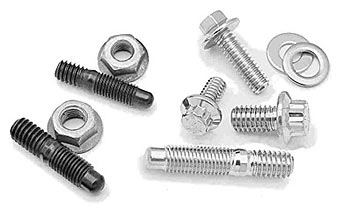Studs
Studs are type of mechanical fasteners used in fastening various products, including pipes used in different applications. These type of fasteners are threaded on one or both ends. Studs are headless bolts, threaded , sometimes with different threads. One end of the stud is secured to an object while the other end is used typically with a nut. They are available in both Metric and English threads. Stud Fasteners are available in all forms to suit any application.
Materials used:
- Metallic studs
- Steel
- Copper
- Aluminum
- Brass
- Bronze
- Silicon bronze
- Titanium etc.
- Non-metallic studs

- Plastic
- Fiber-reinforced plastic
- Polyvinyl chloride (PVC)
- Polyvinylidene fluoride (PVDF)
- Nylon
- Polytetrafluoroethylene (PTFE)
- Synthetic rubber
Finishes on studs:
Studs are available in various finishes. Some popular finishes are:
- Can be anodized
- Coated with phosphate or black oxide
- Plated with gold, silver, tin, nickel, zinc
- Zinc chromate
- Chrome galvanized etc.
Features of studs:
- Good strength
- Reasonable cold ductility
- Excellent high temperature ductility
- Good conductivity
- Excellent corrosion resistance
- Good bearing properties
- Low magnetic permeability
Types of studs:
- Gland or tap-end stud: It has an interference fit at one
end and a free-running thread at the other.
- Double-end stud: It has free-running threads at both
ends.
- Three-bolt stud: Used in high-temperature/pressure
applications.
- Standard stud: Used for general-purpose applications.
Advantages of studs:
- Studs help in eliminating deviations from perfect squareness in
an assembly.
- The basic advantage of using a stud rather than a bolt or screw
is the ability of a nut to "float" and adjust on the nut
end threads.
- The thicker the cover plate, or the longer the tapped hole, the
more important the stud becomes.
- In assembling and reassembling heavy parts , for example, turbine
casings and cylinder heads, studs can act as pilots.
- In the automatic assembly of small, lightweight units, studs help
in reducing assembly costs. They permit quick and easy "stack
up" of gaskets or other different parts of a joint or two
different pipes.
- Studs also help in reducing the need for the large hole clearance
and close hole alignment which are usually required by a cap screw
or bolt.
- Studs with an interference-fit thread or proprietary-lock thread
on the tap or pipe end gives a positive lock against turning and
loosening.
- Studs also provide sealant to prevent leakage of fluids through
holes tapped in porous materials.
The points mentioned below will be a guide for the buyers:
